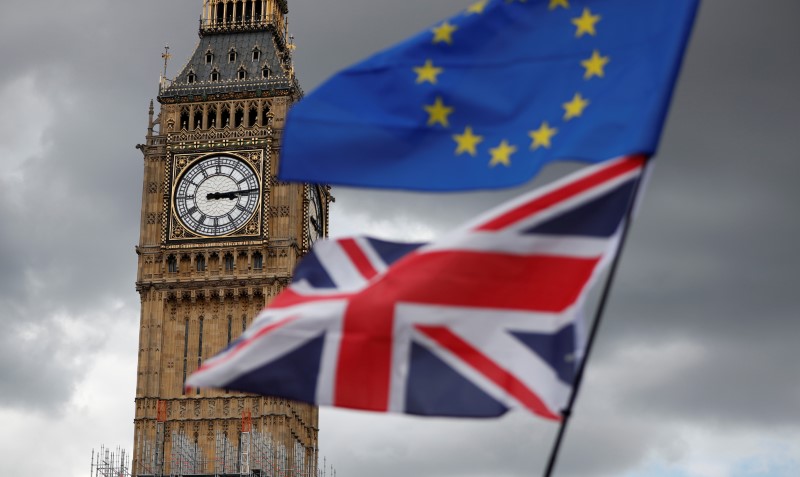 © Reuters. The Union Flag and a European Union flag fly near the Elizabeth Tower, housing the Big Ben bell, during the anti-Brexit ‘People’s March for Europe’, in Parliament Square in central London
© Reuters. The Union Flag and a European Union flag fly near the Elizabeth Tower, housing the Big Ben bell, during the anti-Brexit ‘People’s March for Europe’, in Parliament Square in central LondonBy Huw Jones
LONDON (Reuters) – Even if Britain agrees a Brexit transition deal with the European Union next month, bankers and regulators say it is unlikely to provide the legal certainty they are seeking.
Britain’s 2016 vote to leave the EU prompted banks to call for a “standstill” transition and new trading terms to avoid hasty decisions on moving staff and operations to meet EU regulators’ demands to do so by “Brexit Day” in March 2019.
“There won’t be legal certainty for a while even if they reach political agreement in March,” Oliver Moullin, head of Brexit at the Association for Financial Markets in Europe, said.
That poses a “tricky question” for the banking trade body’s members in deciding how much they can rely on a political deal, which may not become legally watertight until year-end, as the basis for their Brexit planning, Moullin said.
Transition is one part of a divorce deal which will not be formally approved by governments until October or later.
The issue is hotly debated within the British government itself and Prime Minister Theresa May met with senior ministers on Thursday to agree on what sort of future trade deal to ask from Brussels to follow transition.
Her acceptance of a status quo transition has been called a “betrayal” by Brexit hardliners in her party.
Britain’s ministry for exiting the EU (DExEU) said that a time-limited implementation period is in the interests of both sides and it is confident of reaching a deal by the time of a European Council meeting scheduled for March.
“Looking at what can they actually provide in March, it is not completely obvious how they would achieve it,” said Catherine McGuinness, head of policy at the City of London, which administers the capital’s main financial district.
“It also needs to be clear that it will survive any agreement – or even no agreement – that is struck in October about the ultimate trading relationship,” she added.
MORAL HAZARD
Any political agreement on transition must give regulators the flexibility not to insist on worse-case contingency planning, Stephen Jones, chief executive of UK Finance, a banking lobby, said.
But EU regulators are racheting up the pressure, a senior banking official said, demanding Brexit plans be prepared as if transition will not happen, even if they also hint at `some flexibility in implementation.
“Regulators have said to us that transition is very valuable but it could create moral hazard, that is banks rely on it and don’t prepare,” the banking official added.
The European Central Bank (ECB) said it has received only eight license requests, although regulatory sources say more are being negotiated between banks and regulators behind the scenes.
Bundesbank board member Andreas Dombret said his biggest concern is that banks run out of time, leaving the EU without the full suite of financial services it gets from London.
“We need those services for our export industries, for the Boschs, Siemens, Daimlers, and Volkswagens. We need to have it in a competitive way and in a legally sound way,” Dombret said.
Banks in London should not rely on a transition deal or wait for full legal certainty, but submit license applications that can be amended later on, Dombret told Reuters.
“We don’t know if we will have an implementation period or not. Nobody can tell you now. You have to plan for a hard Brexit, as many are doing,” Dombret added.
Banks have welcomed a proposal by Andrew Bailey, chief executive of Britain’s Financial Conduct Authority, who wants a transition deal that gives British and EU regulators cover for a cross-border cooperation pact.
This would mean no longer assuming a “no deal” Brexit as the primary scenario and address “operational issues” like contract continuity, or ensuring that cross-border financial contracts like insurance policies that straddle Brexit Day can pay out.
So far there has been no formal response from the EU, leaving banks faced with seeking the permission of customers to shift the legal basis of contracts from Britain to the EU.
“We are completely prepared to have this type of cooperation agreement as there is a huge exchange of data between the UK and the EU, but we need clear agreement at the political level,” a senior EU regulator told Reuters.
Source: Investing.com





























